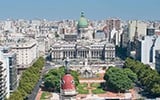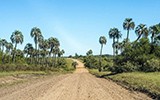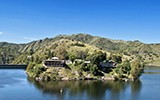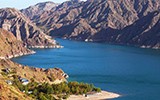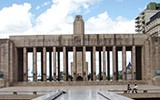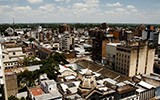Argentina is one of the top destinations in Latin America to get married in and, with a recent change in the law, non-residents ...
Living in Argentina guide for expats
All the information you need to relocate and live in Argentina.
Our selection of articles for expatriation in Argentina
Are you looking for accommodation in Mendoza? Here is some information which may ease your search.
Sports have a very important place in Argentine society, with several disciplines, including swimming, soccer, rugby, volleyball ...
Argentina is a country with a broad blend of vibrant history and modern life. While the nation appreciates newcomers to enjoy its ...
Depending on your situation in Argentina, you will probably have to open a local bank account to pay for rent, bills, etc. Banks ...
Argentines, don't say Argentinians, are friendly once you get to know them and they get to know you. If you want to stay and ...
It is not difficult to find a job in Argentina as an expat, as the country is home to numerous national and international ...
Buenos Aires has a large multiethnic and multicultural community and is a fascinating and welcoming city for students choosing to ...
Buenos Aires, Argentina's capital city, welcomes thousands of expatriates from across the globe every year. Buenos Aires has ...
Healthcare in Argentina is often very good quality and is considered among the best in Latin America. However, the level of care ...
Do you dream of gaining work experience in Argentina while having enough time to enjoy a variety of unique and exceptional ...
The city rarely sleeps, and there are plenty of chances to explore weekend fierias and 2- and 3-day trips to Patagonia, Mar de ...
Buenos Aires has something for everyone to do, especially when they have friends or family coming to visit. Sure, every city says ...
Tango, passion and good air (Buenos Aires), the best part may be the culture, people and cuisine. In a city where food is a ...
Argentina is a very sporty nation where a person can enjoy a wide variety of sports. Football, of course, is just about the most ...
About Argentina
The Republic of Argentina, also known as Argentina, is a South American country. It is divided into four zones: fertile plains, flat country, dry plains and mountains. Stretching over 2,780,400 km2, it shares its borders with Paraguay in the north, Bolivia in the northwest, Chile in the west and Brazil and Uruguay to the northeast and east, as well as the Atlantic Ocean. The capital of Argentina is Buenos Aires. Its major cities are Cordoba, Rosario, Mendoza and Santa Fe.
Demography
To date, Argentina's population amounts to over 42 million people. It is one of the Latin American countries with the strongest influence of European culture. This is mainly due to the annual expatriation rate experienced by the country. Buenos Aires remains the most popular city being the main place where expatriates from Italy, France, Germany, Spain, the UK and Asia have settled.
Argentina's official language is Spanish. However, some indigenous languages such as 'Quechua' and 'Guarani' are spoken in many regions. Moreover, English and Portuguese are taught at school during the second cycle.
Economy
Argentina is one of the most developed Latin American countries. It is also the region's third largest economy. In 2012, its gross domestic product (GDP) amounted to 475 billion U.S. dollars. Growth rate was 3 % while inflation stood around 10%.
The country's key economic pillars are the agriculture, mining, manufacturing and services sectors. Argentina's main allies in terms of exports are Brazil, Chile, China, the United States and Spain. Moreover, the country mainly imports products from Brazil, the U.S., Germany and Mexico.
Politics
Argentina is a Presidential Republic with a multiparty governing system. The executive power is held by the government. The President of the Republic is also head of state and head of government. The legislative power, on the other hand, is held by members of the government and those of the two houses of parliament. Cristina Fernández de Kirchner is the President since December 2011 and Aníbal Fernández has been elected Prime Minister of Argentina.
Climate
Argentina has a humid subtropical climate in the north and an arid sub-Antarctic climate in the south. In some parts of the country, the temperature can drop to 0°C in winter and can climb up to 45°C in summer. As for rainfall, some 2500 mm are occasionally recorded in the forest regions. Arid regions only enjoy 100 mm rainfall. Patagonia is the coldest part of the country with a temperature of -10°C in winter and 35°C in summer.
Latest housing offers in Argentina

